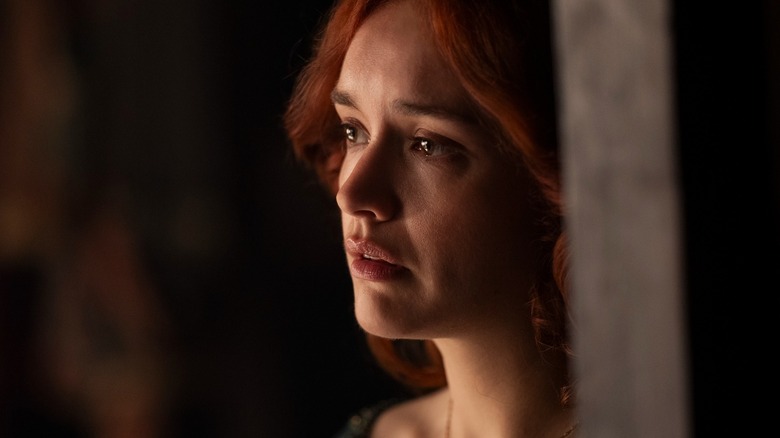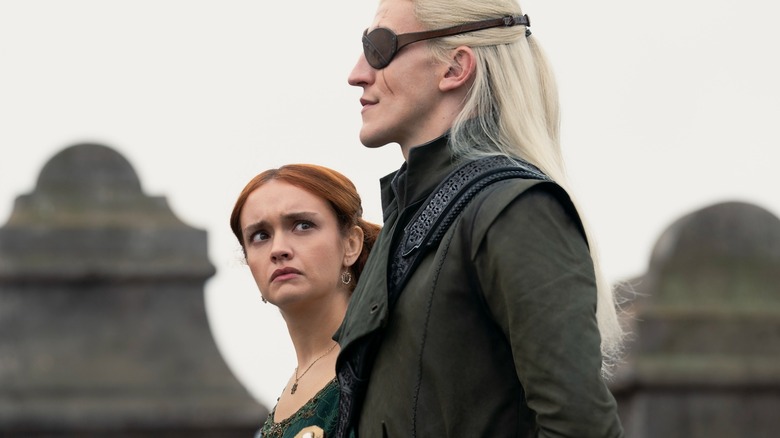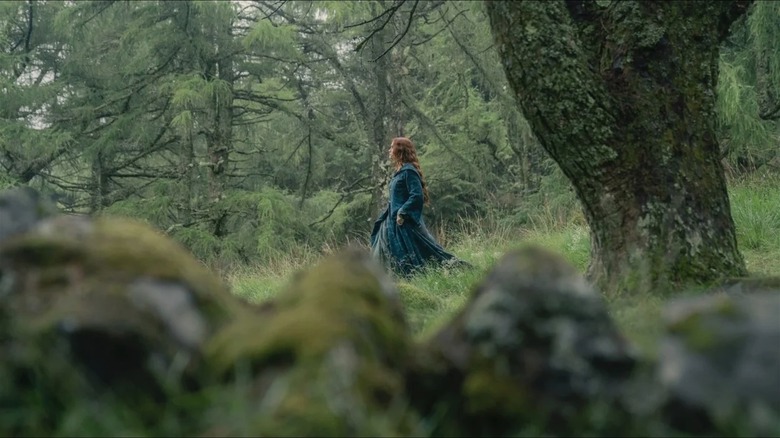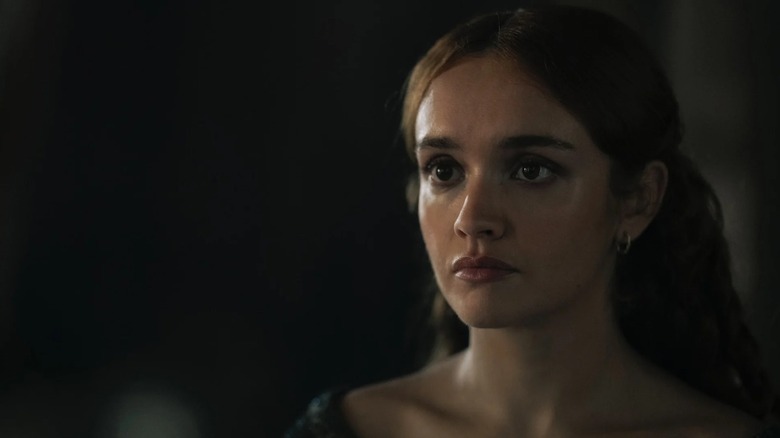House Of The Dragon Season 2: The True Meaning Behind Alicent's Lake Scene In Episode 7
This post contains spoilers for "House of the Dragon."
Alicent Hightower (Olivia Cooke) finds herself in an impossible position at the moment. Forced to become a child bride and assume royal responsibilities before she could verbalize her innermost instincts, Alicent has been duty-bound from the get-go, at the cost of completely alienating herself. The first wedge between her and Rhaenyra (Emma D'Arcy) snowballed into a storm of jealous resentment, fueling her decisions to carve out her authority at the Red Keep and oppose Rhaenyra's claim to the throne. It has been years since she had worn her green dress to declare the start of an impending war — a decision with lasting repercussions, both deliberate and unintended — but now she feels discarded by the same people she had sworn to protect. In "House of the Dragon" season 2, episode 7, "The Red Sowing," Alicent retreats in an attempt to hold on to frayed autonomy, which leads to a stroll through Kingswood and a cathartic dip in the lake.
After Aegon (Tom Glynn-Carney) is declared unfit to continue his rule as king, Aemond (Ewan Mitchell) takes over the throne with detached ruthlessness while establishing that Alicent's presence isn't needed in the Small Council anymore. "The crown is grateful, and your services are no longer needed," he tells his mother, completely robbing her of the hard-earned autonomy she had scrambled to gather over the years. The uprising among the smallfolk, which leads to her and Haelena (Phia Saban) being attacked by the discontent mob, rattles her, leading to a turning point that evokes pertinent questions about destiny, self-worth, and the drive to keep going.
Cooke spoke to TIME about Alicent's state of mind in "The Red Sowing," and what it means for her to shift away from the chaos of the Red Keep and take refuge in the sacred solitude of the Kingswood.
Alicent contemplates longevity in House of the Dragon
After regretting the decision to put Aegon on the throne, Alicent had hoped to steer her firstborn towards more tempered decision-making, but a string of factors, ranging from the sacking of Otto Hightower as Hand to the events at Rook's Rest, put an end to these plans. Although Aemond has a more surefooted understanding of politicking than his brother, he is cold and impulsive. It's a combination that does not bode well during such a volatile situation. Her movements inside the Red Keep are also constantly tracked, and solitude is a luxury for someone like Alicent, which prompts her to venture into the Kingswood with a trusted guard. Cooke explained to TIME why this moment is so crucial:
"Alicent needs to get out of King's Landing to figure out the longevity of her house, family, and herself. The longevity of her life and her daughter's life, and how sustainable it is at this point. She needs to be able to plot without Aemond looming, and without being used as a chess piece. She's gone off to try and make all of these humongous decisions that will impact the regency, possibly, forever."
Alicent's wardrobe is also of note here. She chooses a vibrant yet comforting blue instead of her signature green robes, electing to exist simply for herself for a fleeting moment before returning to the heavy burden of the regime she represents. Although robbed of the power she used to wield, she is still the Queen Dowager and a mother who must do her utmost to protect her children. But at this moment, these roles fade into the background, and she is just Alicent, unsure and contemplative, walking through the woods while considering what the future might hold.
Finding liberation without being constantly monitored
The burden of sin has been embedded within Alicent's consciousness for quite some time, especially after the gruesome Blood and Cheese incident that traumatized Haelena for life. This, combined with her sexual relationship with Criston Cole (Fabien Frankel), makes her feel "unclean," culminating in compulsive scrubbing during her solitary baths and the urge to confess her sins to her father. Alicent's relationship with Cole is fueled by a need to assert her bodily autonomy and reclaim her sexuality (which she was denied due to her marriage to Viserys), but even this attempt is marred by Cole's ingrained misogyny and general hypocrisy in not acknowledging her in court and treating her like an afterthought.
This escalating shame and need to feel clean propels her towards the lake, and she sheds off the layers of her outer dress (which signifies the masks put on for the world) and takes a dip, as if born anew. Cooke compared this to a "baptism" of sorts, where the swim is an act of embracing self-liberation:
"There's a theme with her feeling shamed and unclean throughout the season. We saw Alicent with Ser Criston Cole and what happened in the aftermath of her being romantically involved with him. She never felt pure from that moment on. There's this compulsion to scrub her skin raw in order to purge the rot from what she did and how she feels she is to blame. This felt like a baptism. Stripping the outer layer, and that f***ing collar [laughs]. Her getting into the lake on her own is embryonic, in a way. It's weirdly a coming-of-age moment for Alicent — the start of the rest of her life, what she's about to do, and the woman she's possibly about to become."
Alicent is a flawed character who still deserves empathy
There are no unblemished heroes in Westeros, as humans cannot attain perfection even when chasing a morally sound existence, which turns out to be contextual and subjective in some situations. Alicent is no saint, and she knows this. The precise impetus for her moral dilemma this season is this uncomfortable awareness of her part in the war, and how much she might have contributed to the mess both Houses find themselves in at the moment. If anything, she blames herself for events beyond her control and believes that she is being punished by the gods for her transgressions — a feeling distinctly absent in men who have done worse, not by accident, but by design, yet still carry on without any guilt or remorse.
Alicent's hostility towards Rhaenyra is not some bottomless pit of anger and resentment, as there is love in there somewhere, which makes their rift so unbearably tragic and bittersweet, as it is a pure bond that festers over time. Their meeting at the Sept highlights this and heightens Alicent's guilt after she learns that the war might have been ignited because she misunderstood Viserys' final words. Moreover, her being sidelined by the all-male council mirrors how Rhaenyra was undermined in similar ways during her time at the Red Keep, with Alicent actively participating in patriarchal traditions to further her cause at the time. This is not meant to be a "gotcha" moment, as this only underlines the desperate measures women often have to take in patriarchal societies, and how these decisions end up further alienating them.
Alicent has never tasted freedom, but the sight of a bird flying unencumbered propels her toward this sentiment. What will she do next, and will she finally be free?
The "House of the Dragon" season 2 finale premieres on HBO and Max on August 4, 2024.



